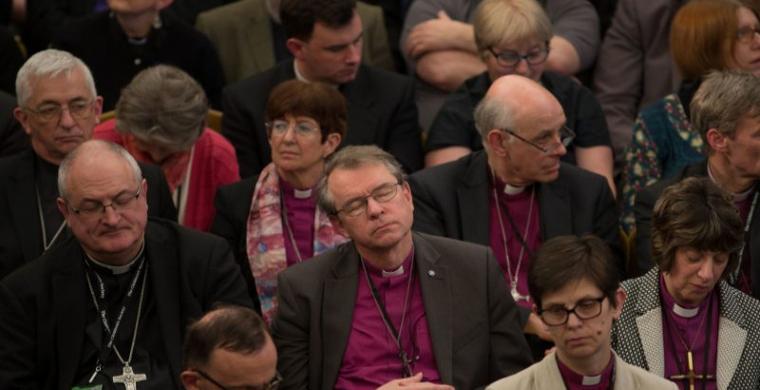Conservative Anglicans are close to despair. Is the CofE about to split?
As an Anglican, I used to think theological liberalism was on the wane. Not any more
FOTO: Attendees at the Church of England's first General Synod of the year in February (Getty)
By Andrew Sabisky
http://catholicherald.co.uk/
July 20, 2017
Anyone with a lick of sense can see that the Church of England is in serious trouble. Congregational decline, child abuse scandals, and financially desperate cathedrals are just the most obvious symptoms of a very broad disease. As an Anglican, I have been confident that the Church would manage to turn things around in a few decades. After the most recent meeting of General Synod, however, I am no longer so confident.
On the face it, the Synod's changes were all fairly minor. For all the fuss, the proposal to write official liturgies affirming the new gender identity of transgender people may well be ignored even by Church's own bishops; and the changes on regulation of vestments merely rubber-stamps what already takes places across swathes of the Church.
But the most significant thing about the Synod was the manner in which it was conducted. The bishops stayed largely silent as Synod did theology by endless anecdote. The only notable episcopal contributions came from the liberal northern prelates (especially Paul Bayes of Liverpool). An outburst of anti-capitalism from the Archbishop of York provided comedy value amongst the general dour air of neo-Puritanism. The monotonous drumbeat of socialism and sexual liberalism was only broken by the ecumenical contribution of Bishop Angaelos of the Coptic Orthodox Church, who warned Synod that it's bad for PR and the soul to spend so much time talking about sex. His plea fell on deaf ears.
Leading conservative Synod members seem to have left in a state of mind verging on despair. They have suffered no major defeats, but seem confident that it's only a matter of time. The general consensus is that the "middle third" of Synod has no more appetite for gruelling fights or media uproar, and will quietly acquiesce to liberal demands for church blessings of same-sex marriage, to be shortly followed by same-sex marriage itself.
Nor does anyone think that this will meet with any more than token resistance amongst the Church's bishops, who seem to have largely abolished their own traditional role in developing doctrine, and handed it over to Synod. The Church selects bishops largely on their ability to avoid controversy and act as (at least nominal) figures of unity, a near-impossible role in a Church marked out by so many theological divisions. They are very carefully chosen so as not to have strong opinions on matters of faith. Consequently the ranks of the episcopacy are packed full of weak men. The chronic cowardice is part of the reason why their instinctive response to child abuse is cover-up, not rigorous public investigation.
Previously I was convinced that church liberalism would shortly hit its high-water mark and decline rapidly, simply because it is so bad at reproducing itself: the liberals would give way to the more orthodox younger clergy. In reality, though, it seems as though the Church of England is more likely to simply wind up going down the same path as The Episcopal Church in America, where it has dramatically fragmented as it liberalized. The orthodox either went to the various Continuing Anglican churches -- most notably the Anglican Church in North America (ACNA) -- or became Roman Catholics. The seeds of such fragmentation are already being laid in the UK via the consecration by ACNA of a missionary bishop for the UK and Europe, who will operate outside the structures of the Church of England.
In another possible scenario, the Church of England will not formally break up, but will radically de-federalize into a series of "churches within a church". All meaningful power would devolve to various bodies representing the various theological traditions. The Society of St Wilfrid and St Hilda is already well-set to take on this role for the traditionalist Anglo-Catholics, and no doubt a similar umbrella body could easily be set up for the more conservative evangelicals. These bodies could select their own priests, instead of training and ordination being managed by the diocese. Parishes would routinely affiliate with their favoured national umbrella body; the "Church of England" label would be limited to a strictly secondary place in their branding.
This would relieve the various factions of the apparently intolerable burden of having to tolerate one another. It would also end the ludicrous situation where bishops are tasked with being figures of unity in dioceses where no unity is possible. The Church would, in effect, have consciously uncoupled itself, achieving a peaceful separation without going through the expensive bother of formal divorce.
However, such a separation would leave the historic sees of Canterbury and York in the hands of the unsound. When governments try again, over the next several decades, to push through some form of legalised euthanasia or liberalised abortion, they will find willing accomplices governing over the husk of the Church of England, useful chaplains to the culture of death. The price for abandoning the fight for the centre of the Church will ultimately be paid in lives.














